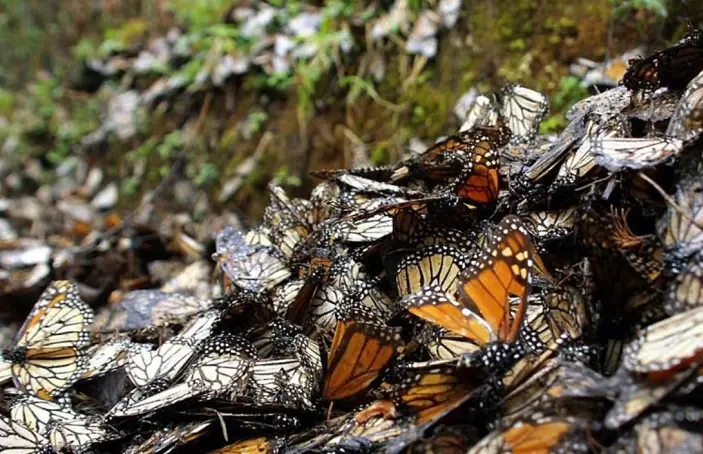
Monarchs have died off in huge numbers since the mid-1990s, and California just saw even greater losses.
The majestic monarch butterfly is a symbol for biodiversity and environmental health in North America, a land once teeming with wildlife.
But now the iconic species may be on the verge of dying out due to habitat loss, overuse of pesticides, and other similar factors.
Recently, it was said that the species has seen a decline of over 80 percent from their original counts in the mid-1990s, and things don’t appear to be getting any better (especially since companies like Monsanto and Bayer refuse to change their ways when it comes to toxic pesticides and GMOs).
With the monarch hanging on for dear life, supporters just received some bad news: a veritable Holocaust may be happening in California.
Monarch butterflies plunge 86% in one year, report says
According to a report from CNN, the monarchs’ numbers plunged by 86% since late 2017 in coastal areas of California, as discovered via a yearly count from the Xerces Society, an international nonprfit dedicated to preserving invertebrates and their habitats.
The Thanksgiving survey found numbers far worse than expected.
“It’s worse than anyone had anticipated,” the Xerces Society said according to a post on its website.
“We are very troubled to observe such an apparently large decline in the population this year.”
Monarch butterflies typically migrate to California and spend their winters in the state, which has a large amount of farms including organic farms, but also a high volume of pesticides sprayed each year.
In 2016, 209 million pounds of total applied active ingredients were recorded on 101 million acres worth of farmland.
How to help save the monarch butterfly
While the monarch is under serious threat, there are many ways to contribute to its resurgence.
First and foremost, buy organic foods and support local farmers whenever possible.
Organic food isn’t always 100% pesticide-free, but organic farmers help maintain healthy soil and are far better for biodiversity according to studies.
True organic farming does not utilize any synthetic pesticides, and those farmers who do spray use far smaller volumes of (other, more natural) pest-killing substances.
Secondly, avoiding GMOs is important. Genetically engineered foods are part of a “modern” agricultural apparatus designed by Monsanto and other companies to sell more chemical pesticides. Learn more about the dark, untold history of GMOs in the book ‘Altered Genes, Twisted Truth’ and avoid GMOs whenever possible.
Monarch butterflies also suffer from a loss of habitat due to pesticides killing off milkweed, which is the only plant their larvae eat and the only plant they lay eggs in. Planting milkweed helps set monarchs up for success so they replenish their numbers.
You can find milkweed seeds online for planting and even milkweed seed bombs, which are an easy way to spread the invaluable plant. You can also create a “monarch waystation” comprised of flowers that create habitats for breeding.
Finally, you can choose to support a charity that supports the butterflies and their recovery.
According to Greenpeace, SaveourMonarchs.org and Monarch Watch are recommended.
Alternatively, steer clear of the Farmers for Monarchs organization as it is supported by the very companies responsible for monarch deaths, including Bayer and Monsanto.
Thanks for installing the Bottom of every post plugin by Corey Salzano. Contact me if you need custom WordPress plugins or website design.




